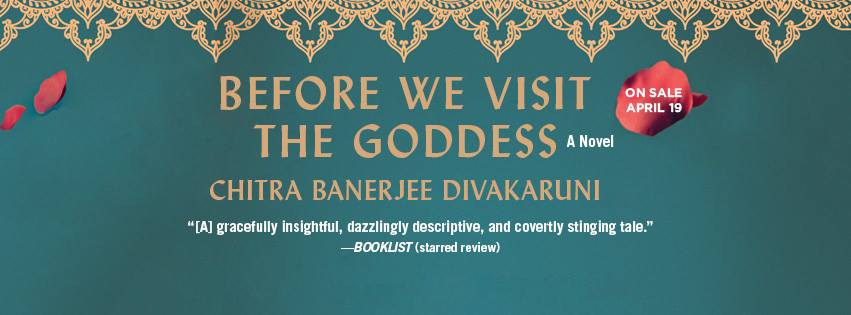
by Ragini Srikrishna – Follow @browngirlmag
“Before We Visit the Goddess,” by Chitra Banerjee Divakaruni weaves a story that is all too familiar – unresolved issues between mothers and daughters. The story revolves around three main characters – Sabitri, Bela, and Tara. Sabitri, the grandmother runs a sweet shop in Kolkata, India. Bela, Sabitri’s daughter, runs away to America with Sanjay, a refugee she fell in love with. Tara, Bela’s daughter, decides to drop out of college as she struggles to find her identity. All three women are forced to forgo their education. It seems like a trifecta of women all heading down the same path of regrets with their poor choices and bitter lessons.
The book begins with a letter from Bela to Sabitri in which Bela tells her mother that Tara plans to drop out of college. In response, Sabitri writes to her granddaughter Tara, whom she has never met.
“Granddaughter, people look down on a woman without education. She has few options. To survive, she is forced up with ill-treatment. She must depend on the kindness of strangers, an unsure thing. I do not want that for you.”
This is a key lesson that Sabitri lives by as she has struggled to get her education which she never completed. She tries to receive an education by becoming a live-in help with a rich family who ill-treat her. Then, when she falls in love with the wrong man – class issues interfere with the completion of her education.
A painful sense of reality is set up for the reader as they go along the life journey of the three women. All encounter misogynistic men in a world where they start out naive and hopeful. The reader sees how each generation of women faces nearly identical choices, yet the wisdom from the previous generation is not imbibed by the next leading to a vicious cycle.
What is it that makes a mother-daughter relationship so complicated? Every daughter wants to become something that isn’t her mother. The worst thing for a daughter to hear is, “You are just like your mother.” All the daughters in “Before We Visit the Goddess” strive to have lives far from their mothers. Yet they end up in the same cycle of unhealthy relationships, identity crises and denying their sexuality in a heteronormative culture.
Unhealthy Relationships
Bela runs away from Sabitri’s home in Kolkata to be with Sanjay in America. Sabitri is against their marriage as she wants Bela to finish her education and not depend on a man. As Bela comes to America, not only does she depend on Sanjay, but they both depend on his Uncle Bishu, who makes criminal choices to keep their family alive. Trapped and pregnant, Bela has no choice but to remain with the two of them. This spills over to her daughter Tara, who makes choices that she hopes are different from her mother’s.
Tara chooses to be with Robert, whom she thinks of as special. She believes he is nothing like her father. who cheated on her mother. Yet Robert is soon shown to be unfaithful.
All three women have unhealthy and dependent relationships with the men in their lives. These men, in turn, seem to lack empathy and loyalty. Worse yet, they all fall into the same pattern of patriarchal control whether in India or America. They show no appreciation of the women they have in their lives.
Identity Crisis—Forging an Individual Path
“Before We Visit the Goddess” tries to indulge the reader in a feminist storytelling format. The storytelling is split between the three opinionated women who attempt to forge their own paths. Tara and Bela seem independent by running away from their homes. Yet, they do so with men their mothers don’t approve of, which lead to harsh consequences. While the book resonates with common archetypal themes of mother and daughter, each woman faces a unique identity crisis. As the daughters move overseas, issues of migration, sexuality and individualism impact their identity. The identity crisis of the daughter discovering her own identity distinct from her mother’s is a common thread. The book does well with allowing a reader to relate to their own mother-daughter paradigm.
Sexuality in a Heteronormative Culture
Larger questions of female sexuality and misogyny in Indian culture are explored in one chapter of the book. Tara finds herself volunteered to drive a visiting Indian man Dr. V. to the Meenakshi temple in Houston, Texas. At first, the spiky-haired, scorpion-tattooed Tara and the middle-aged, straightlaced Dr. V appear to have little in common beyond their ethnicity. In the drive to Houston, both discover and share their own loss and the drive revives memories they had repressed. Dr. V lost his daughter to suicide after she came out to her father in India. Tara had an abortion which she told no one about. Both had gone through a deep sense of “shame” stemming from being Indian in a patriarchal structure. Arguably, this was the best chapter in the book.
The story then transitions into the perspective of Kenneth, a gay best friend of Bela’s. They help each other overcome past relationships, becoming family at a lonely time. Kenneth never reveals his sexuality to Bela. When Bela discovers this she feels as though another man has betrayed her trust. Through Kenneth, the reader gains a perspective of Bela’s life, one filled with violence and mystery and why she made the choices she did.
Lessons
The final lesson of the book lies in a letter the grandmother writes to her granddaughter. Sabitri’s happiest moment had been when she created a recipe in the back of her kitchen store. Sabitri writes to Bela, on how fortunate a woman is to have financial independence and creativity.
“Satisfaction overwhelmed me. This was something I had achieved by myself, without having to depend on anyone.”
The book really brought home to me, how all too often as women we try hard to stop our worst fears from coming true. This in itself can create the circumstances we were trying to avoid in the first place. Avoiding the mistakes our mothers made, is one such overarching concern. Much like us, the protagonists in this novel end up seeing their worst fears come true. That they are not that different from their mothers and worse yet make the same mistakes.
 Ragini is passionate about social justice and storytelling. When she’s not playing soccer or rock climbing, she tries to explain the world to herself and others, through her art, videos, and writing.
Ragini is passionate about social justice and storytelling. When she’s not playing soccer or rock climbing, she tries to explain the world to herself and others, through her art, videos, and writing.




